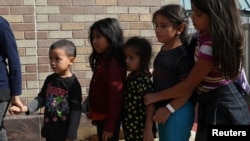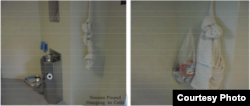The Trump administration was unprepared to institute its "zero-tolerance" immigration enforcement policy at the U.S.-Mexico border earlier this year, according to a government watchdog report released Tuesday.
Children were held longer than they should have been in facilities meant for short-term detention, the report by the Department of Homeland Security's Office of Inspector General (OIG) said. Later, when the policy was ended, the government had no means to track the children in order to reconnect them with their parents.
The OIG reviewed multiple facilities along the U.S.-Mexico border in late June to assess the implementation and effect of the government's zero-tolerance policy, which mandated that adults who illegally crossed the border face criminal charges and be held in detention centers while their cases were resolved.
Because of the lengthy detentions before their cases could be heard, the adults had to be separated from accompanying children, who, by law, could not be held with them.
The law states children can be held for 72 hours before being transferred to another government agency, such as the Department of Health and Human Services (HHS), which is charged with the care of unaccompanied children.
About 800 children were held longer than 72 hours. In one case, a child was held as long as 25 days, according to the OIG report.
Customs and Border Patrol (CBP) officials told the OIG inspectors that the extended child detentions were necessary because HHS was not able to find suitable homes for the influx of children.
Nonexistent database
Homeland Security announced in late June that it and HHS had "a central database" containing location information for separated parents and minors that both departments could access and update.
But the OIG found no evidence that such a database existed. After a series of interviews, OIG found that the database was "actually a manually compiled spreadsheet maintained by HHS, CBP and ICE (Immigration and Customs Enforcement) personnel."
Without a database, agency officials had further difficulties reuniting parents and children because the departments' data systems were not integrated.
In addition, the report, which said it does not "evaluate the merits of the zero-tolerance policy or family separation," identified the following:
• "DHS regulated the number of asylum-seekers entering the country through ports of entry at the same time that it encouraged asylum-seekers to come to the ports."
• "DHS provided inconsistent information to aliens who arrived with children during zero tolerance, which resulted in some parents not understanding that they would be separated from their children, and being unable to communicate with their children after separation."
The zero-tolerance policy was in effect from early May until President Donald Trump rescinded it by executive order on June 20.
"The report confirms what we've documented through our own monitoring efforts — that Immigration and Customs Enforcement and the GEO Group systematically violate the rights of detained individuals and subject them to health and safety hazards," immigrant advocate Freedom for Immigrants said in responding to the report. GEO Group is a private prison company that runs a detention center in Texas where immigrants were being held.
Homeland Security spokeswoman Katie Waldman said in a statement the OIG report shows the "difficulties in enforcing immigration laws that are broken and poorly written."
'Nooses' in cells
A second OIG report found serious problems at an immigrant detention center in California, including 'nooses' in detainee cells, and delayed or inadequate medical care.
OIG inspectors visited the Adelanto ICE Processing Center in May for an unannounced inspection.
"In about 15 of approximately 20 male detainee cells … we observed braided bed sheets referred to as 'nooses' by staff and detainees," the report said.
While inmates described the sheets as being used to protect their privacy or useful as a clothesline, one detainee told OIG inspectors he had observed their use in attempted suicides, according to the report.
OIG inspectors observed doctors registering that they had been to disciplinary segregation wards to check on detainees. But the inspectors said they witnessed the doctors having no contact with 10 of 14 detainees on the day of their visit.
In addition, the report said the waiting list to see a dentist is months, and sometimes years, long.






